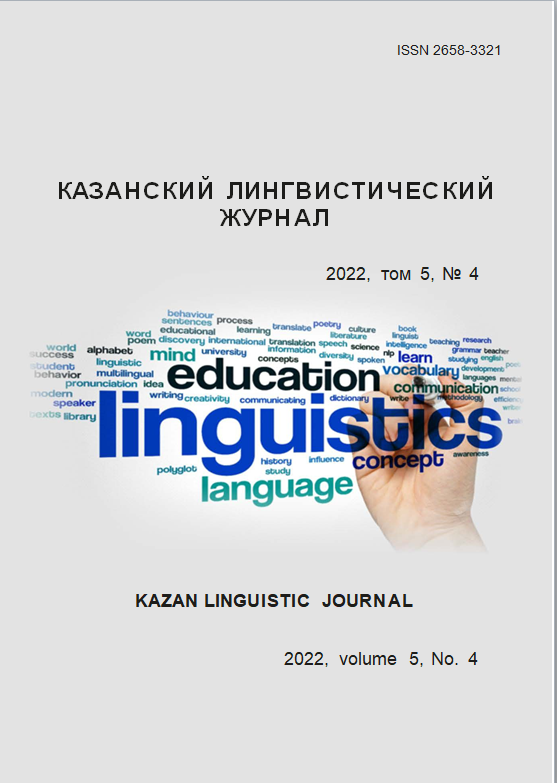Methods of Translation of German Compound Words in the Publicistic Texts into Russian
https://doi.org/10.26907/2658-3321.2022.5.4.559-569
Keywords:
translation, linguistics, composition, publicistic text, compound word, compositeAbstract
Compound words play an important role in German and are one of the most discussed topics in linguistics. A huge number of linguists have studied the problems of word composition: M.D. Stepanova, W. Fleischer, G. Haken, V.P. Furmanova, L.K. Latyshev, M.I. Nosacheva and others. Compounding is one of the most productive ways of word formation in German. There are many areas in which compound words are often used, and the publicistic texts are not an exception. The formation of compound words is a complex process and the translation of these words into other languages is a difficult task for translators. The aim of this study is to analyze the ways of translation of the German compounds in the publicistic texts into Russian. The analysis was carried out on 200 lexical units selected by continuous sampling from “Economics” and “Politics” sections in the newspaper “Die Zeit” and in the online news site “Deutsche Welle”. Most compound words under analysis are two-part lexical units. Composites consisting of three or more stems are rarely used, as they are difficult to perceive. The study showed that more than 50% of the German compounds are translated into Russian using calque translation. In 27.5% of cases analogous Russian words were used. 12% of the analyzed compounds were rendered into Russian using descriptive translation and in 8% of cases the method of generalization was used.
References
References
Stepanova M.D., Fleischer F. Theoretical foundations of word formation in the German language. M.: Higher school; 1984. (In Russ.)
Nosacheva M.I. Word-formation features of adjective composite terms of German clinical terminology. International Conference (V Baudouin Readings): Proceedings and Materials. Ed.: K.R. Gataullina, E.A. Gorobets, G.A. Nikolaev. Publisher: Kazan (Volga Region) Federal Universi-ty (Kazan). 2015: 249–252. (In Russ.)
Nikitina O. A. The formation of new words with the participation of exogenous word-building elements in modern German. News of the Tula State University. Humanitarian sciences. 2011; 1: 568–577. (In Russ.)
Furmanova V.P. Intercultural communication and linguistic and cultural studies in the theory and practice of teaching foreign languages. Saransk: Publishing House of Mordov. university; 1993. (In Russ.)
Zwilling M.Ya. Heuristic process of translation and development of translation skills. On translation and translators: Digest of scientific articles. M.: Eastern book; 2009: 91-96. (In Russ.)
Vinogradov V.S. Introduction to translation studies (general and lexical issues). M.: Pub-lishing house of the Institute of General Secondary Education of the Russian Academy of Educa-tion; 2001. (In Russ.)
Semyonov A.L. The main provisions of the general theory of translation. M.: Publishing house of the Russian University of Friendship of Peoples; 2005. (In Russ.)
Haken G. Synergetics. M.: Mir; 1980. (In Russ.)
Latyshev L.K. Translation technology. M.: Academy; 2008. (In Russ.)
Deutsche Welle (Deutsche Ausgabe), 12.03.2022. Available from: https://www.pressreader.com/germany/deutsche-welle-german-edition [accessed 20.03.2022]. (In Germ.)
Russian online edition Deutsche Welle, 12.03.2022. Available from: https://www.pressreader.com/germany/deutsche-welle-russian-edition [accessed 26.04.22]. (In Russ.)
Zeit online, 12.01.2022. Available from: https://www.zeit.de [accessed 20.03.2022]. (In Germ.)
Zeit online (Russian online edition), 12.01.2022. Available from: https://www.dekoder.org/ru/source/zeit-online [accessed 27.04.2022]. (In Russ.)






